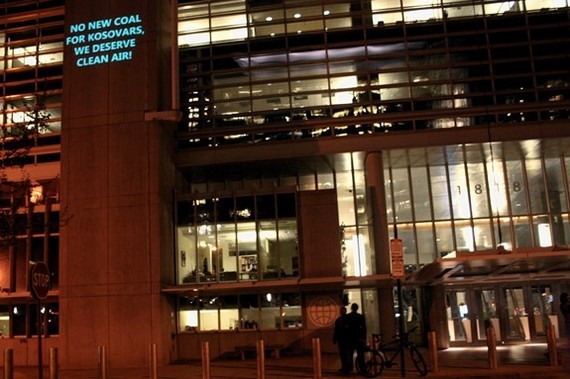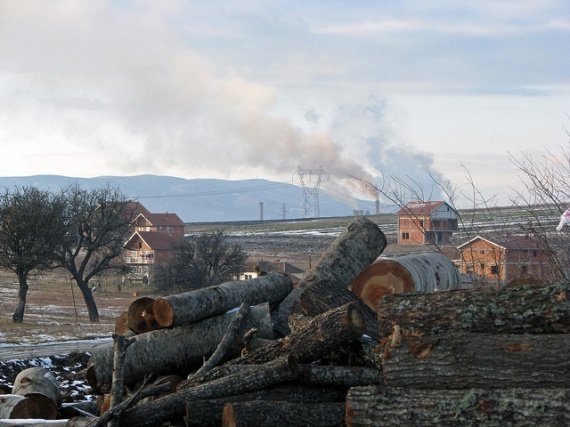For Europe's youngest nation, Kosovo, its vast reserves of lignite have been both a blessing and a curse. As the country progresses, this abundance of lignite has trapped it into using only this source of energy for its needs. Lignite is known to be one of the most carbon-intense forms of coal. Its usage accounts for environmental destruction and health implications. Today, 98% of Kosovo's electricity needs are secured through lignite, generated in two outdated and dirty power plants. The Government of Kosovo plans to yield to international institutions to build a third lignite-based power plant in the country next to its two existing plants. This same government has refused to develop or invest in any other sources of energy. The fight between the Government's plans and civil society organizations' ask to shift toward clean energy in the country is at its peak.
Major international development and financial agencies have engaged in developing and restructuring Kosovo's energy sector. The World Bank Group (WBG), European Bank for Reconstruction and Development (EBRD), German Development Bank (KfW), USAID are among a few to mention. The WBG and EBRD have expressed their interests to work with the Kosovar Government on pushing forth the idea of a third lignite-based power plant. The US Government is on board as well. A vote on this project isn't foreseen until later next year and only after an Environmental and Social Assessment for the project is finalized. CSOs from the country have refused to stand by and watch, and instead have provided an alternative plan, published by University of California Berkeley, which would help put Kosovo on a path toward a cleaner energy future. It looks like some of the aspects raised in the alternative plan are finally being taken seriously by these international actors.

Photo caption: Activists project their demand for clean energy in Kosovo on the World Bank HQ building (Photo credit: Nicole Ghio)
The U.S. Agency for International Development (USAID) last week announced the launch of a new program "to support improving Kosovo's ability to provide secure, cleaner, and affordable energy." The program is called "REpower Kosovo". This new activity is a multifaceted five-year activity that will aim to "support the Government of Kosovo's efforts to modernize the country's electricity sector and open the door to new clean energy projects in Kosovo." USAID has allocated $12 million to the REpower Kosovo program, which will provide technical assistance "to help overcome the barriers to develop and implement clean energy projects in Kosovo, and to create an enabling environment that attracts private investments in the Kosovo energy sector." CSO groups have been continuously calling on the Government and foreign aid and financial institutions to remove barriers that are halting clean energy projects in Kosovo. Investors themselves haven't been silent either.
EBRD will provide €30m loan to Kosovo Transmission, System and Market Operator (KOSTT) to improve energy security in Kosovo and the region. This loan intends to enhance the stability and reliability of the country's power network by reducing inefficiencies in transmission and will be mostly used for the construction, rehabilitation, and placing into operation of selected substations, transformers, and electricity transmission lines. This loan comes after EBRD announced last year 12 million euros to the Kosovo Sustainable Energy Projects Framework (KoSEP). The EU office in Kosovo and the Norwegian Government chipped in to help with additional funds. The framework is designed to encourage small and medium-sized enterprises and private households to invest in energy efficiency technology and the efficient use of energy.
The problem of energy efficiency is crucial and the World Bank agrees that it is a huge problem. In June this year this institution approved a US$31 million for Kosovo Energy Efficiency and Renewable Energy Project. This project aims "to reduce energy consumption and fossil fuel use in public buildings." A 2013 World Bank market assessment in Kosovo showed that the building sector accounts for 48 percent of final energy consumption, and has an energy efficiency potential of about 44 percent. Public buildings showed the highest savings potential at 38-47 percent in municipal buildings, and up to 49 percent in central government buildings. This topic is also a centerpiece of the University of California Berkeley study.

Photo caption: Kosova A, a lignite-based power plant in the outskirts of capital Prishtina in Kosovo is Europe's largest point source of air pollution (Photo credits: World Bank, Flickr CC BY-NC-ND 2.0)
Another large project under construction is a new transmission line between Albania and Kosovo, sponsored through a loan and grant by the German Development Bank (KfW). The projected cost for the 241km long 400kV line is 75.5 million euros. This line will effectively merge the two electricity markets and create conditions for a more efficient system. This line is critical to both countries' needs, as Albania entirely bases its energy on hydro production, and Kosovo almost entirely on lignite. Kosovo CSOs argue that better regional integration will lead to tapping into new energy sources for the country. Initially, this would happen through electricity exchanges and later through accessing new sources of energy.
As Kosovo positions itself to join the European Union in the near future, the country's energy profile bears great importance. The Union has just adopted stricter rules to decrease the greenhouse gas emissions and increase energy efficiency and renewables. With this in mind, the stakeholders need to finally understand and act on the need to diversify the energy options for the country. Whether these clean energy initiatives are an honest engagement from their side or only an attempt to cover a big, dirty new lignite-based power plant remains to be seen in the months ahead. Kosovars are certainly watching out for what's to come, as that will affect their future one way or another for many years to come.
